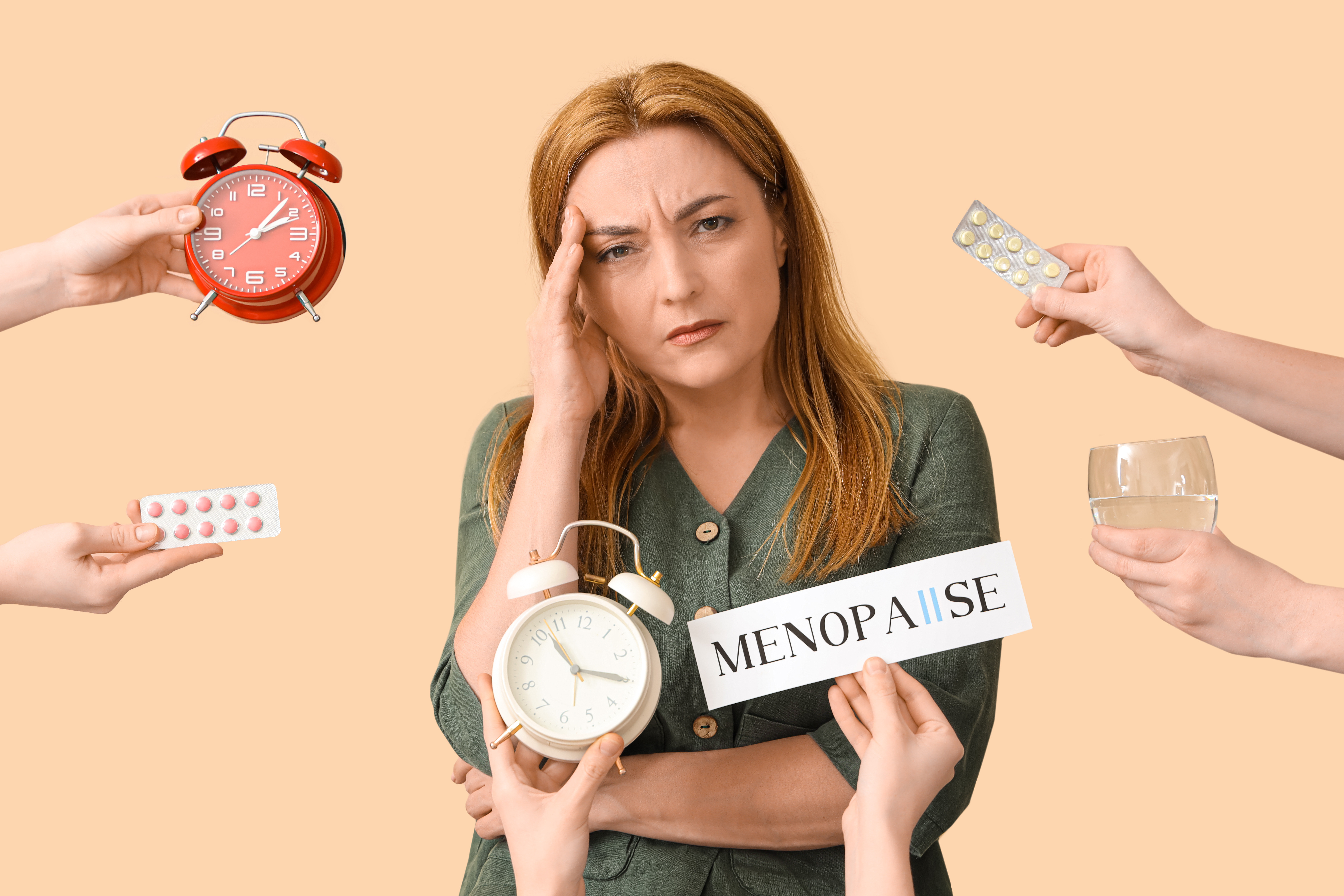Menopause - what's happening to me?
Menopause can bring about a wide range of symptoms due to hormonal fluctuations and changes in a woman's body. Menopause occurs naturally between the ages of 45 and 55 years, with a median age of 51 years.
After several years of perimenopause where hormone levels, particularly oestrogen, fluctuate irregularly, leading to changes in menstrual cycles and various symptoms, menopause marks the end of a woman's menstrual cycles and fertility.
Menopause is diagnosed when a woman has gone 12 consecutive months without a menstrual period. It is a natural biological process that usually occurs in the late 40s to early 50s, although the timing can vary. Once menopause is reached, the ovaries stop releasing eggs and produce lower levels of oestrogen and progesterone, leading to the cessation of menstrual periods and the end of the reproductive years.
Menopause itself is a one-time event that marks the end of a woman's menstrual cycles and fertility. This phase typically lasts for the remainder of a woman's life. However, it's important to note that the symptoms associated with menopause, such as hot flushes, night sweats, mood changes, and vaginal dryness, can vary in duration and intensity for each individual. While some women may experience these symptoms for only a few years, others may experience them for a decade or more. Symptoms can gradually decrease over time for many women, but they may persist to some extent into postmenopause. Postmenopause refers to the period of time after menopause has been reached. During this stage, hormone levels stabilise at lower levels, and many of the symptoms associated with perimenopause and menopause may diminish or disappear altogether. However, it's still important for women to prioritise their overall health and well-being during postmenopause, including maintaining regular healthcare check-ups and screenings.
What are the range of symptoms during menopause?
- Cessation of menstrual periods: The absence of menstrual bleeding for 12 consecutive months, indicating the end of the reproductive years.
- Hot flushes and night sweats: These symptoms may persist into menopause for some women, although they may decrease in frequency and intensity over time.
- Mood changes: Some women may experience mood swings, irritability, or feelings of sadness or anxiety during menopause.
- Sleep disturbances: Insomnia or disrupted sleep patterns may continue to be a challenge for some women during menopause.
- Vaginal changes: Thinning, drying, and loss of elasticity in the vaginal tissues can lead to discomfort, pain, or increased risk of vaginal infections.
- Bone density loss: Decreased oestrogen levels can contribute to bone loss and increase the risk of osteoporosis in postmenopausal women.
- Changes in skin and hair: Some women may notice changes in skin elasticity, thickness, and moisture levels, as well as changes in hair texture or distribution.
It's important to note that not all women will experience every symptom, and the severity and duration of symptoms can vary widely among individuals. Additionally, some symptoms may overlap or persist beyond the transition from perimenopause to menopause.
What is recommended to support women through menopause and perimenopause?
It is increasingly important for women to look after their physical and mental health. Pharmacists can help women keep track of their symptoms and provide resources on management strategies. The goal of managing menopause is to alleviate symptoms and reduce any risk of complications such as osteoporosis. There are several treatment options available to manage the symptoms of perimenopause and menopause, ranging from lifestyle changes to prescription medications.
Here are some common non-pharmacological approaches
- Lifestyle changes like a Healthy diet - eating a balanced diet rich in fruits, vegetables, whole grains, and lean proteins can help support overall health and manage symptoms like weight gain and mood changes.
- Regular exercise:Engaging in regular physical activity, such as walking, swimming, or yoga, can help reduce symptoms like hot flashes, improve mood, and promote better sleep.
- Stress management:Practising stress-reduction techniques such as meditation, deep breathing exercises, or mindfulness can help alleviate symptoms of stress and anxiety.
- Avoiding triggers: Identifying and avoiding triggers such as caffeine, alcohol, spicy foods, and tight clothing can help reduce the frequency and severity of hot flashes and night sweats.
- Hot flushes can be reduced by wearing layers to remove when needed, having a cool drink of water, and avoiding triggers such as caffeine, spicy foods, a warm environment, stress, hot weather and alcohol.
If symptoms persist or are not alleviated by non-pharmacological interventions, it is advisable to seek guidance from a medical practitioner.
Reference:
- Stress, Anxiety and Ageing. Healthdirect 2023. At: https://www.healthdirect.gov.au/stress
- Menopause. eTG complete. Melbourne: Therapeutic Guidelines; 2020
- Australian Menopause Society (AMS) 2022. At: www.menopause.org.au/about-ams
- Australian Government of Health. Healthdirect. Menopause. 2020. At: www.healthdirect.gov.au/menopause
- Menopause. Mayo Clinic 2022. Mayo Foundation for Medical Education and Research (MFMER). At: www.mayoclinic.org/diseases-conditions/menopause/diagnosis-treatment/drc-20353401
- Managing postmenopause. Australian Journal of Pharmacy; 2022
- Clinical tips: Menopause/Perimenopause. AJP. 2019



